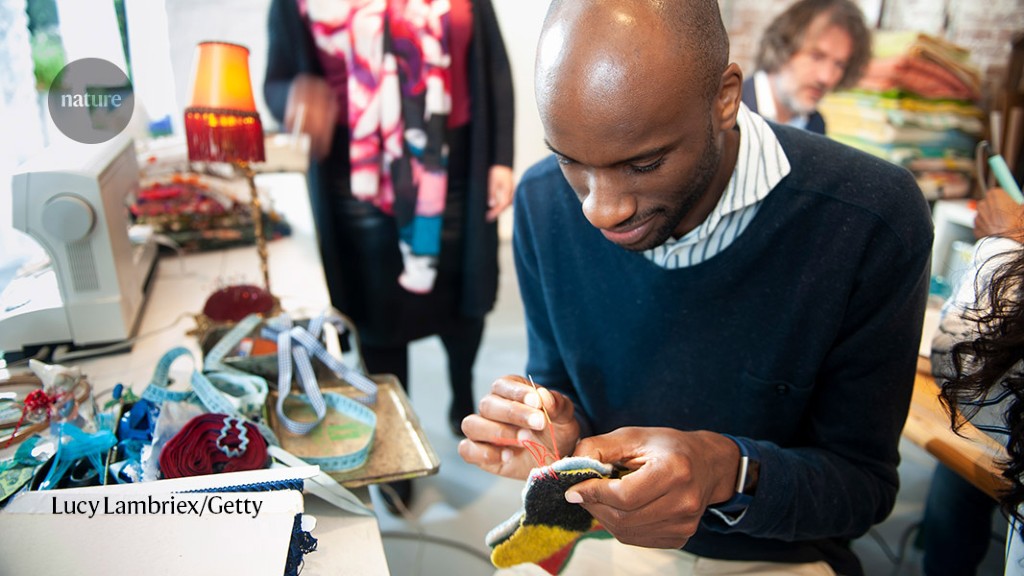Decolonizing the humanities: striving to make the arts and media more diverse Karen Patel leads an initiative to help fix it

For many students from under-represented backgrounds, the career pipeline into creative industries is blocked

Some craft students from minority groups say they feel shut off and don’t recognize themselves in their course materials.Credit: Lucy Lambriex/Getty
Decolonizing science
Nature’s Careers section launched a series of articles in November 2022 looking at how institutions and different disciplines in the natural sciences were seeking to make their curricula and outreach activities more representative of the communities that they serve. This interview and an accompanying one with Meghan Tinsley, who researches ethnicity and inequalities at the University of Manchester, UK, explore lessons from sociology and the humanities.
My research at Birmingham City University (BCU), UK, explores equality and diversity in the professional craft economy. The people involved are mostly artisans who have gone through higher education and who pursue a craft as a career, working with, say, wood or leather, jewellery or ceramics.
I am also director and co-chair of BCU’s Centre for Equality, Diversity and Inclusion in the Arts (CEDIA), which was established in 2021 to promote equality, diversity and inclusion (EDI) across teaching and learning, research and external partnerships in the university’s Faculty of Arts, Design and Media.
CEDIA’s remit includes looking at decolonizing curricula, in consultation with students, individual departments and course directors, and sharing good practice. Decolonizing the curriculum is a collective effort and everyone working in higher education needs to be wholeheartedly invested in it. It can’t be seen as an EDI box-ticking exercise.
I started thinking about this after talking to craft students at other institutions who said they didn’t recognize themselves in the course material, and suggested topics that their lecturers were not aware of. One, studying fashion and textiles, told her tutor that she was interested in a particular African textile craft (she was of North African heritage). She asked whether he had any readings on it that she could access, but he could not help her. She wanted to explore something in her creative work but felt shut off and so tried to find academics at other universities who could help her. Her university should be facilitating that.
CEDIA is about connecting staff, students and external creatives who are interested in EDI. It’s an advocate and a critical voice for equality and diversity, and at its first symposium, held in October 2022, we talked about good practice in terms of making creative organizations more inclusive. We had keynote speakers from the Royal Shakespeare Company, and past and present students shared their experiences.
CEDIA now has five BCU student consultants, one from each arts-faculty department, who are paid by the hour and determine what hours they do, so that they can fit the work around their studies. They review course and student-induction programme materials, as well as external BCU websites, through an EDI lens, and I feed back their comments to the faculty’s equality and diversity committee. This is led by senior management.
Cultural exchange
A master’s student at BCU researched students’ experiences in the university’s media and arts courses, and the results reveal that a lot more needs to be done on decolonizing the curriculum and celebrating cultural diversity at BCU. An online student-led event called Culture Cafe brought students together to talk about their cultural backgrounds. Online spaces can make students feel able to talk more openly. They’re at home and feel comfortable. I want everyone attending a CEDIA meeting to feel they’ve got equal space to be heard and listened to.
BCU’s demographics show that the university as a whole is reflective of the city — and coming here as an undergraduate in 2006 from Dudley, a town nearby, and seeing other students like me, made me feel like university was for me. However, as a mixed-race gay woman from a working-class background, I do not see enough people like me in academia.
The external arts sector, unlike our student body, is quite elitist and the media sector is not diverse, so there is a broken pipeline into industry. Students are not making it into the city’s media and cultural sector (they often have to move to London instead), so our hope is that CEDIA can help to connect external partners with staff and students. One of the things our students asked for was for us to be a bridge for them to go into industry.
I haven’t had any pushback around CEDIA. The only issue we face is the time that’s needed for colleagues to get involved in EDI committees. Most people recognize the importance of doing this, but fitting it in alongside teaching, marking, research and everything else that staff have to do is difficult. The staff I work with have great ideas and do brilliant stuff. It’s up to us to amplify that and connect things, and to keep EDI at the top of people’s agendas by being a critical voice across the university. We need to be persistent to bring about real change in the university and in the wider sector.
doi: https://doi.org/10.1038/d41586-023-01734-2
This interview has been edited for length and clarity.
This story originally appeared on: Nature - Author:Audrey Thompson
















